Ted Cruz Wins Iowa GOP Caucus, Trump Second, Marco Rubio A Strong Third
Ted Cruz won, Marco Rubio surged into a stronger than expected third place, and Donald Trump was humbled just a little bit, but he was hardly a "loser." The race for the GOP nomination has begun for real.
As voters headed into the Iowa Caucuses last night, there were several unanswered questions. The first was whether the final month of polling, which showed Donald Trump passing Ted Cruz to retake the lead in the Hawkeye State, were providing an accurate picture of what we could expect to see when the smoke cleared, or whether the traditional view of Iowa Republicans as heavily evangelical and more inclined to vote for a candidate like Ted Cruz than a candidate like Donald Trump. The second was whether Trump’s campaign was for real, or whether it was largely a Potemkin Village with no real ground operation capable of bringing voters to the polls, thus indicating that the New York businessman’s leads outside Iowa were less substantial than they appeared. Finally, was Florida Senator Marco Rubio a real contender for the Republican nomination, or was he the great hope of the Republican establishment who would ultimately fail to deliver, thus ceding the field to a battle solely between Trump and Cruz. Some of those questions still remain unanswered this morning, but with a race in which Ted Cruz ended up winning, followed by a strong second and third place finish by Trump and Cruz:
DES MOINES — Senator Ted Cruz of Texas, powered by a surge of support from evangelical Christians, dealt a humbling loss to Donald J. Trump in the Iowa caucuses on Monday, throwing into question the depth of support for Mr. Trump’s unconventional candidacy.
In the first contest of what so far has been more a populist revolt against the political order than a traditional Republican primary, Senator Marco Rubio of Florida finished a strong third, bolstering his case to consolidate the support of Republicans uneasy about the two top finishers.
With 98 percent of precincts reporting, Mr. Cruz had nearly 28 percent of the vote, Mr. Trump 24 percent and Mr. Rubio 23 percent.
Mr. Cruz’s victory was hard-earned. He fought off a barrage of attacks in the campaign’s final weeks from Mr. Trump as well as from Iowa’s longtime governor, Terry E. Branstad, and Republican leaders in Washington who warned that the hard-line Mr. Cruz would lead the party to electoral disaster this fall.
Having felled the brash Mr. Trump, who unceasingly predicted victory and dominated the race up until the first voting, Mr. Cruz can credibly portray himself, to conservatives who have yearned to unite behind a strong champion, as a giant-killer.
“To God be the glory,” Mr. Cruz told jubilant supporters. “Tonight is a victory for the grass roots. Tonight is a victory for courageous conservatives all across Iowa and our great nation.”
The close race illustrated just how turbulent the Republican race may be, with the vote fragmenting between Mr. Cruz’s evangelicals and Tea Partyadherents, Mr. Trump’s blue-collar political newcomers and Mr. Rubio’s mix of conservatives and pragmatic Republicans hungry for victory.
Turnout was about 185,000, a record, according to Edison Research, which conducted entrance polls at precincts across the state. Mr. Trump’s success had been expected to hinge on whether he could mobilize his supporters. But the turnout was not enough to deliver him a win, even though 46 percent of those who turned out were participating in a Republican caucus for the first time.
Instead, Mr. Trump paid the price for building only a rudimentary political organization in the state: The brew of energy and anger powering his candidacy did not fully translate into votes.
“I love you people. I love you people,” a subdued-sounding Mr. Trump unconvincingly told a crowd of Iowans in West Des Moines. “We will go on to get the Republican nomination, and we will go on to easily beat Hillary or Bernie or whoever the hell they throw out there.”
Mr. Trump’s celebrity-fueled airplane hangar rallies proved no match for Mr. Cruz’s fervent appeal to Christian values in winning over Iowa’s evangelical voters, who made up nearly two-thirds of those who did show up to caucus. Mr. Cruz won about a third of the evangelical vote.
That achievement was even more remarkable given the competition Mr. Cruz also faced from Mr. Rubio and Ben Carson, the spiritually minded retired neurosurgeon, among others. When Mike Huckabee and Rick Santorum won the Iowa caucuses in 2008 and 2012, respectively, they did so without formidable opposition for those voters. (Each ran again this year but failed to earn significant backing.)
The victory for Mr. Cruz also was a validation of the Iowa tradition that success here comes from intensive retail campaigning. He built an extensive organization and spent months visiting each of Iowa’s 99 counties.
The throngs of Iowans who came to see Mr. Trump’s improvisational performances, by contrast, may have come away entertained, but not enough of them seemed persuaded that he was presidential.
The question for Mr. Cruz now is whether to compete aggressively in New Hampshire, which votes next Tuesday, or divide his time between there and the next battleground, South Carolina, which holds its primary on Feb. 20 and has an evangelical population closer in size to Iowa’s.
Mr. Cruz has trailed well behind in recent New Hampshire polls, but Mr. Trump, his aura of invincibility gone, could prove vulnerable there as well. Should Mr. Cruz — whose $19 million war chest is the most money of any Republican candidate — find success with that state’s more secular voters, it would signal that he has the potential to unite a wider Republican electorate.
Yet the strong Iowa finish by Mr. Rubio, the choice of a plurality of voters who said they made their decisions in the last week, will allow him to begin making the case to Republican donors, activists and elected officials that he is the strongest candidate acceptable to them who can win over grass-roots conservatives.
Mr. Rubio’s late surge was a vindication of his strategy: He waited to aggressively compete in Iowa until January, when he crisscrossed the state furiously with 36 events in the final four weeks.
Portraying his third-place showing in the best possible light, Mr. Rubio subtly took aim at both Mr. Cruz and Mr. Trump on Monday, suggesting they could not defeat Mrs. Clinton.
“When I’m the nominee, we are going to unify our party and we are going to unify the conservative movement,” Mr. Rubio said to hundreds of supporters in Des Moines.
While Mr. Cruz, a pastor’s son, counted on Christian conservatives, Mr. Rubio aggressively tried to woo that constituency, too. He ran an ad in which he spoke of “the free gift of Salvation offered to us by Jesus Christ.” And in the final debate before the caucuses, held Thursday in Des Moines, he notably referred to “Jesus Christ, who came down to earth and died for our sins.”
The Washington Post’s coverage, meanwhile, concentrates on Cruz’s win and Rubio’s surge and, like much of the television coverage last night, characterizes Trump as “losing”:
DES MOINES — Sen. Ted Cruz of Texas rallied a broad coalition of conservatives around his anti-Washington message to win Iowa’s presidential caucuses here Monday night, edging out Donald Trump in their battle to claim the Republican Party’s outsider mantle.
Riding a late wave of momentum, Sen. Marco Rubio of Florida finished a surprisingly strong third, just behind Trump, which positions him as the leading establishment choice when the campaign moves to friendlier terrain in New Hampshire.
Trump — the brash billionaire mogul whose populist rage and unconventional campaign have upended American politics — fell short in seeking a decisive victory that would have fully validated his unlikely place at the center of the battle for the Republican presidential nomination. He comes under new pressure to win next week’s primary in New Hampshire, where he has long enjoyed a double-digit polling lead.
With nearly all precincts reporting, Cruz led with 28 percent, followed by Trump at 24 percent and Rubio at 23 percent. The remaining eight major candidates were far behind and in single digits. Edison Media Research estimated GOP turnout at 187,000 voters, about 50 percent higher than four years ago.
Cruz was buoyant and overwhelmed as he claimed victory at a large rally of supporters.
“To God be the glory,” he said. “Tonight is a victory for the grass roots. Tonight is a victory for courageous conservatives across Iowa and all across this great nation.”
At a moment of intense voter anger and frustration with Washington’s gridlock, Cruz campaigned proudly as a Beltway lightning rod. He has been a divisive figure since the moment he was sworn into the Senate in 2013, making more enemies than friends, even among his own party’s leadership.
“Iowa has sent notice that the Republican nominee and the next president of the United States will not be chosen by the media, will not be chosen by the Washington establishment, will not be chosen by the lobbyists, but will be chosen by the most incredible, powerful force where all sovereignty resides in our nation — by we the people, the American people,” Cruz said.
For a Republican Party used to anointing the candidate next in line, all of them white men, the success of Cruz and Rubio was a historic departure. Cruz, 45, and Rubio, 44 — both sons of Cuban immigrants serving in their first terms in the Senate — cemented their roles Monday night as serious contenders for the nomination and offered their party hope of broadening its general-election appeal to Latino voters.
Addressing supporters in Des Moines, Rubio sounded a triumphant and optimistic note, saying he could unite the divided Republican Party and lead the charge against the Democrats this fall.
“They told me that we had no chance because my hair wasn’t gray enough and my boots were too high,” Rubio said late Monday. “They told me I needed to wait my turn, that I needed to wait in line. But tonight, tonight here in Iowa the people in this great state sent a very clear message: After seven years of Barack Obama, we are not waiting any longer to take our country back.”
Cruz overcame a nasty barrage of attacks from Trump, Rubio and their allies — as well as steadfast opposition from Iowa’s political and business elite, including the longtime governor, Terry E. Branstad (R) — to unite evangelical Christians, tea party activists, libertarians and other conservatives.
The first nominating contest answered one of the biggest questions looming over the presidential campaign: Would the throngs of Trump fans who have packed gymnasiums and cheered his incendiary commentary participate in the caucuses, Iowa’s time-honored act of democracy?
Not enough did.
Rubio won over many caucus-goers who waited until the final weeks to pick a candidate, according to preliminary network entrance polling. Evangelical voters, who turned out in record numbers, favored Cruz over Trump and Rubio by roughly 10 percentage points after splitting their loyalties in polls over the past month.
It was disappointing showing for Trump, a celebrity who had never before faced the judgment of voters and could not overcome Cruz’s data-driven appeals. Winning the Iowa caucuses affirmed Cruz’s traditional approach to politicking in Iowa. He entered the race as an underdog, but methodically built a web of relationships in all 99 counties and invested early and heavily in a sophisticated organizing program.
In the end, it seems clear that last night was a testament to the fact that even in an era of all-day cable news, constantly updating news on cable television, on the Internet, and via social media, winning elections still comes down to the same on-the-ground efforts that have characterized electoral success for generations. Much like Mike Huckabee in 2008 and Rick Santorum four years ago, Ted Cruz’s campaign approached Iowa the old-fashioned way, by spending the better part of the year building up a campaign organization and an on the ground operation designed specifically to get people to their caucus locations. Cruz also relied upon the traditional Iowa practice of visiting and speaking to voters in small groups as much as possible, although its unclear if he managed to visit all 99 of Iowa’s counties like Santorum did four years ago. His victory last night, by a wider margin than Rick Santorum’s four years ago although not as wide a margin as Mike Huckabee in 2008, is in no small degree testament to the fact that these techniques still work, especially in a state like Iowa, and that a candidate like Cruz, with deep roots in the evangelical an religious conservative community is obviously a natural fit for a state where that group dominates the state Republican Party.
As for Donald Trump, there is much to be said. The fact that his campaign was unable to capitalize on his standing in the final round of polls that suggested he was headed for a victory arguably lends weight to the long standing doubts that had been expressed about his campaign’s ability to translate poll numbers into votes, doubts that are likely to follow Trump to New Hampshire and beyond unless he can pull off a victory in the Granite State as polls there are currently projecting. Additionally, coming in second does tend to puncture the image that Trump has carefully cultivated over the past seven months as a “winner.” Had Trump won last night, of course, it would have significantly reinforced that meme and raised questions about whether he was already the inevitable Republican nominee. That’s not true anymore, and of course it never really was. Trump was never going to run the table in the GOP primaries and it was absurd to suggest otherwise. In any case, it’s worth noting that Donald Trump was running for election last night for the first time in his life and managed to come in second place in the first-in-the-nation Presidential contest in 2016. He received more votes than any other Republican other than Ted Cruz has ever received in the Iowa Caucuses. And he did it the first time out. That’s hardly losing, and writing Trump off at this point is utterly premature.
If there’s a real story coming out of Iowa for the GOP, though, it has to be Marco Rubio. For months now, pundits and political observers have been predicting a that Rubio would rise to become the conservative/establishment hybrid candidate capable of taking on both Donald Trump and Ted Cruz, neither of whom is liked very much by many Republicans outside their base of support. While his campaign was in the doldrums for much of the summer, there were signs in the fall that he was picking up support, and the fact that he was garnering endorsements from fellow Senators and top Republican donors was a sign of the faith that was being put in his campaign. While Rubio was failing to rise significantly in the polls, Ted Cruz’s campaign clearly saw Rubio as a threat since they spent more time attacking Rubio than attacking Trump. As the final polling came out, though, it didn’t seem as though there was any evidence of an Iowa surge of the kind that managed to put Rick Santorum over the top four years ago. In the end, Rubio didn’t surge enough to make it to first or even second place, but the fact that he finished so much better than he was expected to in Iowa is a real victory for Rubio. Whether he can capitalize if going forward will be a big part of the story of the month of February.
The celebrations for Cruz and Rubio, and the reflection that Trump’s campaign is no doubt going through this morning, will have to be short-lived. With Iowa behind us, the race now moves on to New Hampshire, which will be voting one week from today, and the most immediate question will be how the outcome in Iowa will impact the Granite State. As thing stand right now, Donald Trump is the dominant leader in the state, holding a 21.7 point lead in the RealClearPolitics average and a 22.2 point lead in the Pollster average. This includes a new poll from the University of Massachusetts at Lowell that gives Trump a 26 point lead over Ted Cruz 38% to 12%, with no other candidate in double digits. In the RealClearPolitics average itself, after Trump (33.2%) and Cruz (11.5%), Ohio Governor John Kasich is tied with Cruz at 11.5%, Jeb Bush follows at 10.5%, March Rubio is at 9.5%, and Chris Christie is at 6.5%. None of the other candidates is averaging above four percent. Going forward, the immediate questions will be what impact the outcome in Iowa will have in the Granite State:
- Will Cruz’s win in Iowa, combined with Trump coming in second, cause the Texas Senator’s numbers to rise in the Granite State, or will the fact that his ultra-conservative message is less compatible with New Hampshire voters end up hurting him in the end?
- What, if any, impact, will the fact that Donald Trump was somewhat humbled last night have on his campaign and his supporters, and is his campaign’s ground game in the Granite State any better than the one in Iowa that obviously wasn’t able to bring out the vote?
- Will Rubio get a bounce in Iowa off his is better-than-expected performance in the Hawkeye State?; and,
- How will the fact that candidates such as Kasich, Chris Christie, and Jeb Bush, who have been performing well in New Hampshire, got trounced in Iowa impact their campaigns?
We’ll have to wait for some polling to get any idea at all as to what the answers to these questions are, but you can expect that these will be the central themes of that race going forward. For example, if Trump can pull off a win in New Hampshire, the fact that he came in second last night will be largely forgotten. If he stumbles again, though, his campaign will be seriously damaged heading into Nevada and South Carolina. If Rubio can pull ahead of the three Governors occupying the “establishment” lane in Iowa with him, it will reinforce his status has one of the top three candidates in the race. And, if Ted Cruz can make New Hampshire a real contest then he will strengthen an already strong campaign.
In any case, the race has begun for real now, and on an almost weekly basis over the next several months we’ll be finding out what the voters have to say.
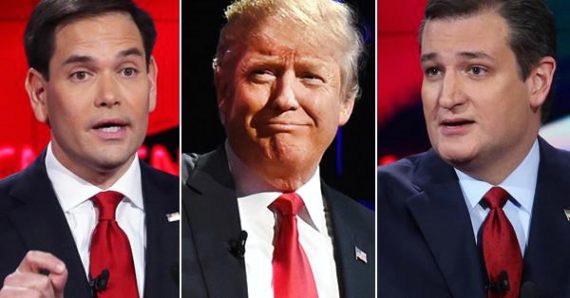

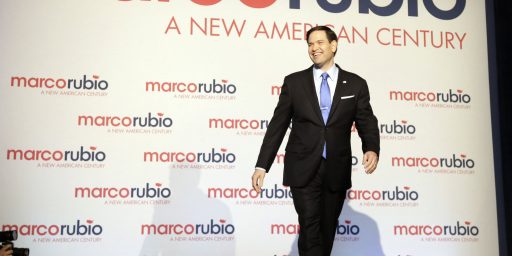
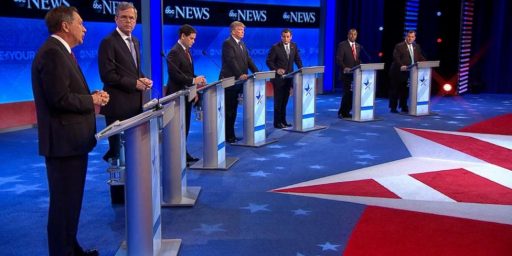
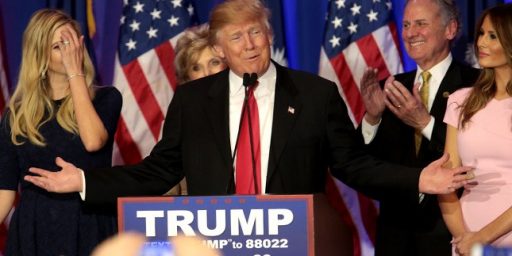
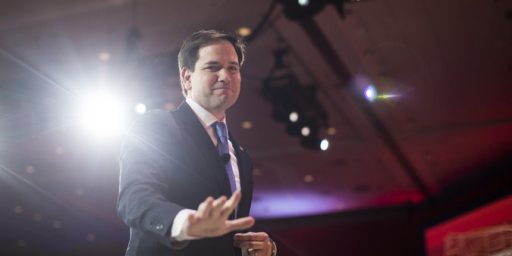
Rubio the rising superstar? The media really really wants the most marketable and least extreme republican to be the nominee so they can pretend they are rooting for a “fresh and moderate” face rather than a pro-life puritan, cut-taxes-and-blame-foodstamps-for-the-deficit-fanatic and extreme hawk. They want a third term for Dubya.
@AEKH:
Yup. If the GOPs nominate Trump or Cruz the press would be forced to confront the fact that both sides don’t do it.
Insanity is doing the same thing over again and expecting a different result. Electing a feckless twit country club Republican worked out so well the last time.
Rubio looks dumber than Little Jebbie!. Who’s beginning to look dumber than W.
3 guys who make Bush-43 look like a friggin’ genius.
so a third Bush term…only even dumber.
I don’t think anyone’s writing him off, but his balloon is seriously punctured now. He’s always been a “second place is the first loser” guy, and America is being reminded of this by many thousands of retweets of a tweet he sent out a while back: “No one remembers who came in second.”And of course we now see his ground game is weak, as many suspected. Does the week between Iowa and New Hampshire give him enough time to fix that in the latter state? I’d think not.
I doubt this defeat in Iowa will dissuade Trump’s hardcore supporters, but it’s still a significant blow to his campaign.
Trump’s balloon is deflated a bit, but not by all that much. The headscratcher everyone was pondering was why would a conservative evangelical base support Trump when he doesn’t embody/stand for their values. Now we see that support had limits. Further, the polling distance between Trump and Cruz was miniscule. When it comes down to it, Ted Cruz is still the Zodiac and I doubt an Iowa win will translate elsewhere.
Rubio might get a nice bump, but I doubt it. Bush has a murder-suicide thing going on, and if his war-chest means anything it will deny Rubio any possibility of victory.
Except that he has promised nothing but winning. So much winning people will be bored and beg for it to stop. Then he lost. Any normal person would walk away humbled. Not a Republican. Republicans know not the meaning of accountability.
He should just file for bankruptcy again and go home. But he won’t. He’s too dumb. And too narcissistic.
As I have said before in this age of cell phones and caller ID polling has become virtually meaningless.
I thought Cruz would pull this off. But what I didn’t see coming is how well Rubio did. From a different perspective, i.e. Cruz v. Rubio., Cruz underperformed. Especially given his vaunted ground game. Cruz got about what was expected of him.
@Ron Beasley: And I’m thankful for that.
@Ron Beasley: Also, I don’t think the people who vote for Trump have all day to go caucusing. (And I don’t mean this as an compliment or insult to anybody. It’s just an observation of the demographics here.)
77% of a record turnout voted “not Rubio” and he is the big winner of the night. What a stupid system.
@C. Clavin:
Right. Just like Hillary walked away in 2008, humbled by the nation’s rejection, and hasn’t run again.
And Carter walked away after losing Iowa in his first primary, yes?
We really dodged a bullet when Clinton walked away after losing both Iowa and New Hampshire in 1992. Someone who stuck around after those two defeats would’ve been too proud to be a proper President. We need someone humble.
No, that type of character flaw is reserved for Republicans.
The paranoid conspiracy theories being devised by the Trumpkins to explain their man’s loss are really hilarious.
@Pete S: Rubio is the “we detest you less than all the other clowns up on the stage” candidate. Bland bland bland.
@Mikey:
People keep saying that, but I’m not seeing the reasoning behind it. He pulled in more Iowa Caucus votes than anyone in history — except for Ted Cruz. That doesn’t say “weak ground game” to me. It says “unprecedented situation” and “Cruz was better”, but there’s no obvious failure by Trump to get his side to come out and participate.
@DrDaveT: Turnout was large for the GOP, period. If Trump had put things together well in Iowa he’d have garnered numbers consistent with his polling advantage, but he didn’t do either.
@DrDaveT: Also, with a hat tip to Grumpy Realist:
http://www.politico.com/story/2016/02/donald-trump-iowa-voter-data-218654